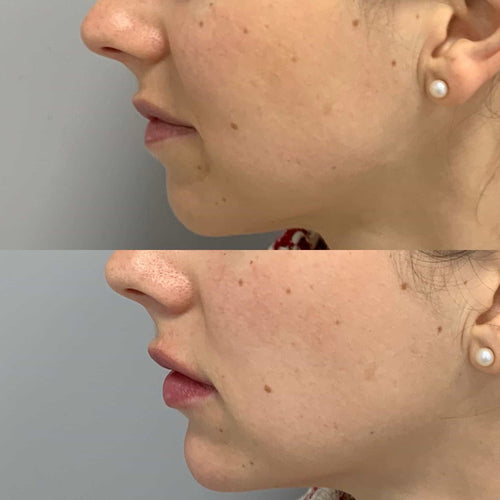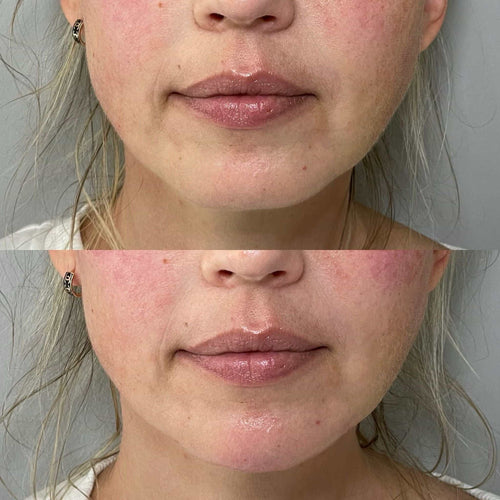Reserve Your Dermal Filler Consultation with Dr. Laura Geige
Understanding Ibuprofen and Lip Fillers
How Ibuprofen Works
Ibuprofen is a nonsteroidal anti-inflammatory drug (NSAID) commonly used to relieve pain and reduce inflammation. It works by inhibiting the production of prostaglandins, which are chemicals that contribute to pain and swelling.
Prostaglandins are synthesized from arachidonic acid, a fatty acid found in cell membranes. Ibuprofen blocks the enzyme cyclooxygenase (COX), responsible for converting arachidonic acid into prostaglandins. By suppressing COX activity, ibuprofen reduces the production of these inflammatory mediators.
There are two primary isoforms of COX: COX-1 and COX-2. COX-1 is involved in protecting the stomach lining and promoting platelet aggregation. COX-2 is primarily responsible for inflammation and pain responses.
Ibuprofen inhibits both COX-1 and COX-2 to some extent. However, it preferentially targets COX-2, making it a more effective anti-inflammatory agent.
The reduction in prostaglandin production leads to several effects:
– Pain relief: Prostaglandins sensitize nerve endings, transmitting pain signals to the brain. By blocking their formation, ibuprofen reduces pain perception.
– Inflammation reduction: Prostaglandins promote vasodilation and increased permeability of blood vessels, contributing to inflammation. Ibuprofen constricts blood vessels and reduces fluid leakage, minimizing swelling.
The Risks of Ibuprofen After Lip Filler
Ibuprofen, a common over-the-counter pain reliever, and lip fillers, a cosmetic procedure that enhances lip volume, both have their own sets of benefits and potential risks. Understanding how they interact is crucial for ensuring a safe and successful outcome after getting lip filler.
Lip fillers are typically made from hyaluronic acid, a naturally occurring substance in the body that helps retain moisture. Injecting these fillers into the lips adds volume, definition, and can even correct asymmetry.
Ibuprofen belongs to a class of drugs called nonsteroidal anti-inflammatory drugs (NSAIDs). It works by reducing hormones that cause pain and inflammation in the body. Common uses for ibuprofen include managing headaches, muscle aches, menstrual cramps, and fever.
While ibuprofen is generally safe when used as directed, taking it after lip filler can increase the risk of complications. Here’s why:
-
Increased Bleeding
-
Bleeding Risk
-
Bruising
-
Swelling
-
Reduced Filler Effectiveness
-
Infection
NSAIDs like ibuprofen can thin the blood, making it easier to bruise or bleed. After lip filler injections, there is already some trauma to the area, making you more susceptible to these issues.
Additionally, ibuprofen’s anti-inflammatory properties may interfere with the body’s natural healing process, potentially impacting the longevity and effectiveness of the fillers.
The duration for which ibuprofen should be avoided after lip filler varies depending on individual factors and the type of filler used. It’s best to consult your injector for specific advice regarding medication usage after your procedure.
Reserve a Dermal Filler Consultation with Dr. Laura Geige Now
They can provide personalized guidance based on your medical history, the amount of filler injected, and any other relevant details.

In general, it is recommended to avoid ibuprofen for at least a few days, if not longer, following lip filler injections. This allows ample time for your body to heal properly and minimizes the risk of complications.
Alternatives to Ibuprofen for Pain Relief
Over-the-Counter Options
While ibuprofen is a common over-the-counter pain reliever, it’s important to be aware of alternatives, especially if you’re considering lip fillers or have other health concerns.
Here are some popular options:
Acetaminophen (Tylenol): This medication works differently than ibuprofen and targets fever reduction more effectively. It’s generally considered gentler on the stomach but may not be as effective for muscle pain.
Naproxen Sodium (Aleve): Similar to ibuprofen, naproxen is a nonsteroidal anti-inflammatory drug (NSAID). However, it tends to last longer, providing relief for up to 12 hours compared to ibuprofen’s 6-8 hours.
Topical Pain Relievers: Creams, gels, or patches containing ingredients like lidocaine, menthol, capsaicin (derived from chili peppers), or salicylates can provide localized pain relief.
**Other Natural Options:**
Cold Compresses: Applying a cold compress to the affected area for 15-20 minutes at a time can help reduce inflammation and numb pain.
Heat Therapy: For muscle aches and stiffness, applying heat through a warm bath, heating pad, or warm compress can soothe sore muscles.
**Important Considerations:**
Always consult with your doctor or pharmacist before starting any new medication, especially if you have pre-existing health conditions or are taking other medications.
Prescription Medications
When it comes to pain relief after lip filler, understanding alternatives to ibuprofen is crucial as taking ibuprofen can potentially lead to complications.

Here are some alternatives you can discuss with your doctor:
-
Acetaminophen (Paracetamol):
-
Topical analgesics: Creams or gels containing lidocaine, benzocaine, or menthol can provide localized pain relief.
-
Antihistamines:
Some antihistamines like cetirizine or loratadine have mild pain-relieving properties and can help reduce swelling.
If you require stronger pain management, your doctor might consider prescription medications such as:
-
Naproxen: A nonsteroidal anti-inflammatory drug (NSAID) similar to ibuprofen, but with a slightly different mechanism of action. Your doctor may prescribe naproxen if they believe the benefits outweigh the risks in your specific case.
-
Tramadol: A centrally acting analgesic that works on the opioid receptors in the brain. It is typically prescribed for moderate to severe pain.
-
Other prescription NSAIDs:
There are other prescription-strength NSAIDs available, such as celecoxib and diclofenac, which your doctor can discuss with you based on your individual needs and medical history.
It’s important to remember that self-medicating after lip filler can be dangerous. Always consult with your injector or a medical professional for personalized advice on pain management options.
When to Consult a Doctor
Swelling and Bruising
Book a Dermal Filler Session with Dr. Laura Geige Today
Swelling and bruising are common side effects after lip filler injections. They typically subside within a few days to a week.
However, it’s important to know when swelling or bruising may signal a more serious issue requiring medical attention.
Consult a doctor immediately if you experience any of the following:
- Excessive swelling that doesn’t improve after a week.
- Severe pain that worsens over time or is accompanied by fever.
- Redness, warmth, or discharge around the injection site, which could indicate infection.
- Vision changes, double vision, or drooping eyelids, as these could be signs of complications affecting surrounding tissues.
- Numbness or tingling that spreads beyond the area of the injections.
- Difficulty breathing or swallowing.
It’s essential to follow your injector’s post-treatment instructions carefully, including avoiding strenuous activity and applying ice packs to reduce swelling.
Ibuprofen can help manage pain and inflammation associated with lip fillers. However, it’s best to consult with your doctor or the provider who administered the injections before taking any medication, as they can advise you on appropriate dosages and potential interactions.
Infection
It’s crucial to consult a doctor if you experience any signs of infection after receiving lip filler.
Infection can occur after any cosmetic procedure, and it’s essential to address it promptly to prevent complications.
Here are some signs that indicate a potential infection:
-
Redness extending beyond the treated area
-
Swelling that increases or doesn’t subside
-
Pain, tenderness, or warmth at the injection site
-
Pus or drainage from the injection site
-
Fever or chills
If you notice any of these symptoms, contact your doctor immediately. Early treatment with antibiotics is crucial to prevent the infection from worsening.
Kurious Kittens Super Sleep Yoga Tattoo Culture Magazine MS Style and Grace Kurious Kittens Pets R4U
- Neck Line Filler Treatment Near Cheam, Surrey - December 21, 2024
- How Long After Lip Filler Can I Take Ibuprofen - December 14, 2024
- How Long Does A Liquid Facelift Last? - December 8, 2024
